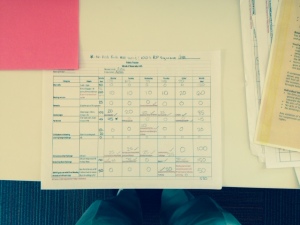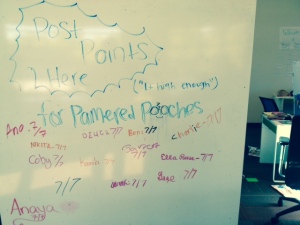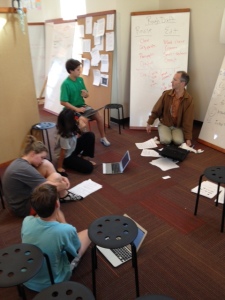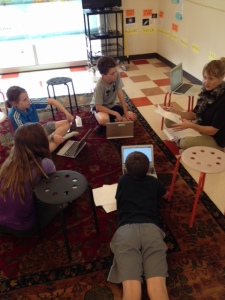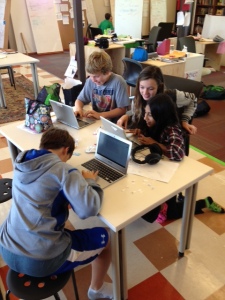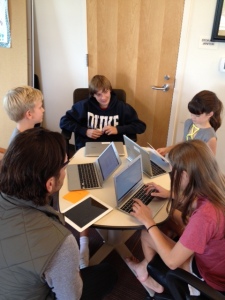Progress is messy. Noisy. Full of angst.
Often you wonder if lessons about pricing; rapid prototyping; and haggling are getting through. Then you have a day of profound happenings.
Today’s Friday Adventure requires finding the most efficient and effective production process for making sandwiches for the homeless; applying lessons learned from MBA level challenges in Pampered Pooches and Galactic Zappers.
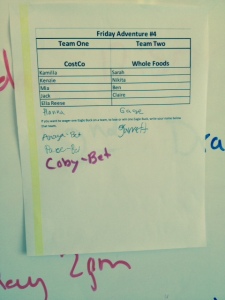
Those who have earned the adventure are split into two teams and armed with $30 for supplies: one team assigned to Costco; the other to Whole Foods.
The goal: Build as many “excellent sandwiches” as possible, at the lowest possible cost per sandwich.
Immediately a question: “Can we haggle to reduce the cost?” Eagles find a way to use last week’s hard earned skill again. A great start.
A list of ingredients. Estimates of amounts needed for each ingredient and the expected cost per sandwich. We are ready.
Overheard on the way to Whole Foods:”At Acton we work hard all week on an impossible set of tasks, to earn the right to do something even harder where we learn even more. But that’s OK, because it’s so fun you can’t wait to get started.”
A profound lesson about motivation.


Eagles split into teams in the stores. Every minute counts because labor costs are $1 per hour, per person. One team hasn’t planned as well and has to start over. Precious time is wasted.
We return to the studio. The first task is for one Eagle to make sandwiches by hand. Five sandwiches take a little over seven minutes, requiring 2.5 cents per sandwich in labor.
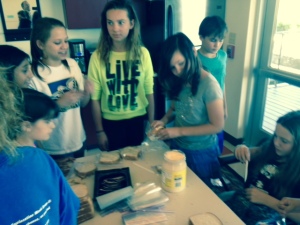
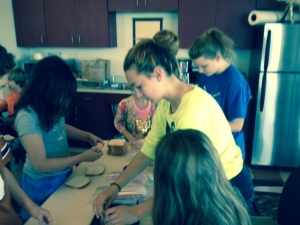
Next Eagles are assigned a role in an assembly line, still paid by the hour. Five sandwiches take one minute and forty seconds. A much faster cycle time, but with six on a team, a cost of 3.3 cents per sandwich in labor.
Management theory is wrong. An assembly line is not more efficient than artisan labor.
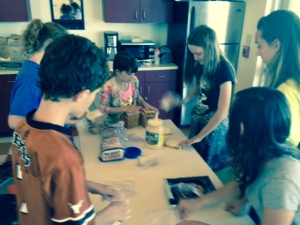
Then one more test. We pay Eagles by the sandwich instead of by the hour. Workers are given the right to self organize. Productivity doubles and the labor cost per sandwich plummets.
Lessons begin to tumble out:
“It’s better to work alone than in an assembly line, if a boss makes the assignments.”
“But if you pay people for completing a task and let each person do what they do best, working as a team is more efficient and more fun.” A profound truth; one of the bedrock lessons of entrepreneurship and a civil society.
One Eagle observes: “If you see a bottleneck, you can assign two people to relieve it.”
Another disagrees: “It’s cheaper to just add WIP in front of a station.” (Adding Work-in-Process inventory is an insight most Harvard Business school graduates would have missed.)
A third Eagle adds: “If you put WIP in the middle of the table where everyone can use it, the process moves even faster.”
This is an intuitive leap into cell manufacturing and the Toyota Method – never mentioned in the readings but discovered through trial and error by a twelve year old. It might have saved Detroit but eluded American auto executives for decades.
Much math is done on the board, in search of Unit Economics. The Costco team is declared the winner, with lower cost ingredients and far higher output. Then a voice from the crowd: “We have to inspect quality.”
Another agrees: “We can’t ask the homeless to eat anything we wouldn’t eat ourselves, just because they don’t have a choice.”
Half of the Costco sandwiches fail inspection; most Whole Foods sandwiches pass. The Unit Economic results are reversed – the Whole Foods team has won.
One last insight: “Increasing volume doesn’t count if you can’t keep quality high too.”
Profound insights. Lessons for a lifetime, deeply imbedded by authentic discovery. Plus forty homeless in Austin who won’t go to bed hungry tonight.

